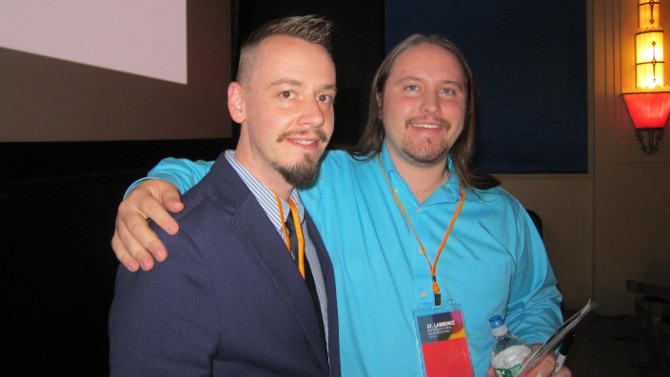Nathan Andrew Jacobs, the writer/director of the independent film Killing Poe, spoke to me at the St. Lawrence International Film Festival back in October. According to him, his film, which built up an unbelievable buzz over the four day festival, has been influenced by the work of Wes Anderson. He mentioned two of Anderson’s movies – The Royal Tenenbaums and Rushmore as being his favourites, and the latter will be reviewed here today.
Jacobs spoke of the classic Wes Anderson aesthetic which he loves so much, and explained his thoughts on how the director returned to his visual roots, in a much more refined way, in his most recent venture The Grand Budapest Hotel. Jacobs also spoke of the very distinctive humour that Wes Anderson is able to bring out of his films. I actually spoke to Jacobs twice over the course of the festival and you can check out one of the interviews below. Also, keep an eye out for another Jacobs’ suggestion, Safety Not Guaranteed, which will run in the near future.
Wes Anderson’s 1998 film Rushmore, which he wrote with Owen Wilson, follows a smart yet eccentric teen named Max Fischer (Jason Schwartzman – who collaborates regularly with Anderson), who is the extracurricular king of the posh Rushmore Preparatory School. The spectacled, neatly coifed young man is involved in everything at the school, from being a playwright and president of the beekeeping club, to an alternate in wrestling and a fencing team member, which has caused his grades to fall and has placed him in the precarious position of being on academic probation. Whilst on his journeys, he befriends the much older Herman Blume (Bill Murray – who also collaborates regularly with Anderson), whose rather immature and moronic twin sons go to school with Max. The dissatisfied middle-aged man is drawn to Max’s ‘togetherness’. Max also begins to fall for primary teacher Rosemary Cross (Olivia Williams), who lost her husband a year earlier. To further complicate the young man’s life, his new friend Blume is also ‘hot for teacher’.
Max is eventually expelled by the headmaster, Dr. Nelson Guggenheim (Brian Cox) and has to go to the very ordinary Grover Cleveland High. Also, Max and Blume begin a long distance feud over the woman. What starts with letters and a cleverly staged bee attack, quickly escalates, leading to Blume running over Max’s bike and Max cutting Blume’s brakes to his car – leading to his arrest. He becomes quite depressed, dropping all extracurricular activities and even stops attending school, after which he becomes an apprentice barber with his father. Eventually, as things usually do in movies such as this, the two unusual friends make peace and Max gets back on the right track. He writes a brilliant play on the Vietnam War and sneakily works to get Blume and Ms. Cross back together.
Rushmore has many things going for it. As Jacobs suggested, it has the Anderson visual aesthetic – which is, simply put, stunning. His thought process is unique, always making for unusual and brilliantly orchestrated shots.
The music must also be mentioned. There is a barrage of excellent sixties music, with well known artists such as The Who, The Rolling Stones, The Kinks, Cat Stevens, John Lennon, The Faces and Donovan leading the way. Yet, there is also some great music from some bands that have been lost to time, such as The Creation and Unit 4 + 2, who had one major hit with Concrete and Clay. It is an excellent soundtrack that feels right for the tone and themes of the movie.
The acting is also solid. This is Schwartzman’s first film and it helped thrust him onto the scene. As usual, Murray is fantastic, bringing a quirky, eccentric character to life (he has made a great career out of creating these types of personas – be it in numerous other Anderson films or in flicks like Caddyshack or more recently in St. Vincent). Williams is strong as the woman who is still dealing with a fractured soul after the death of her husband and Cox is entertaining as always in his role of the headmaster. Smaller roles from Luke Wilson, as Dr. Peter Flynn and Mason Gamble, who plays Max’s much younger sidekick Dirk Calloway, are just as special. The roller coaster ride of a story that Max and Dirk have is especially memorable, as things turn sour for awhile but Dirk is able to help wake Max from his depression and set him on the proper course in restoring his friendship with Blume and righting the ship that is his life.
Rushmore is the movie that helped propel Anderson into fame and he has never looked back. He has continued to make unusual, eccentric and entertaining comedies that are well received. Perhaps this film holds the secret to happiness – when Blume asks Max how he has got things figured out, he explains that: “The secret, I don’t know. . . I guess you’ve just gotta find something you love to do and then. . . do it for the rest of your life.” Great advice from a great movie.


